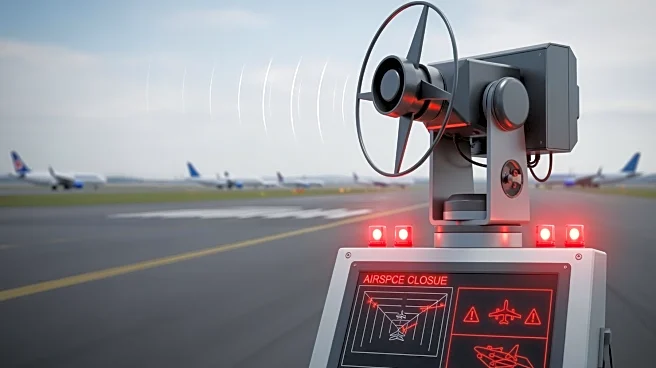What's Happening?
The airspace over Brussels Zaventem Airport was closed following reports of a drone sighting, leading to the temporary suspension of all departing and arriving flights. The incident occurred on Tuesday night, as reported by the public service broadcaster
VRT. Initially, flights were redirected to Liège Airport, which also closed due to a separate drone sighting. The public company responsible for Belgium's civil airspace, skeyes, noted that the first drone sighting happened around 8 pm local time, prompting diversions to other airports such as Ostend-Bruges and Charleroi Brussels South. This incident follows a series of airspace violations in Europe, believed to be linked to Russian activities, which have heightened security alerts among NATO and the European Union.
Why It's Important?
The closure of Brussels Airport's airspace due to drone sightings underscores the growing concerns over airspace security in Europe, particularly in light of recent violations attributed to Russian activities. These incidents have raised alarms among NATO members, prompting discussions on the alliance's preparedness against potential aggression. The diversion of flights and temporary airport closures highlight the operational disruptions and economic impacts that such security threats can pose. Additionally, the situation emphasizes the need for enhanced surveillance and defense mechanisms to protect critical infrastructure and maintain public safety.
What's Next?
In response to these airspace violations, NATO has issued warnings to Moscow and announced the Eastern Sentry programme to deter further incursions and show solidarity with affected member states like Poland. The alliance is likely to continue monitoring airspace activities closely and may implement additional security measures to prevent future incidents. The ongoing tensions between NATO and Russia could lead to further diplomatic engagements or military readiness exercises to ensure the protection of European airspace.
Beyond the Headlines
The drone sightings and subsequent airspace closures at Brussels Airport reflect broader geopolitical tensions between NATO and Russia. These incidents may influence international relations and defense policies, as countries reassess their security strategies in response to perceived threats. The situation also raises ethical and legal questions regarding the use of drones and the implications for civilian air travel safety. Long-term, this could lead to stricter regulations and technological advancements in drone detection and airspace management.
















